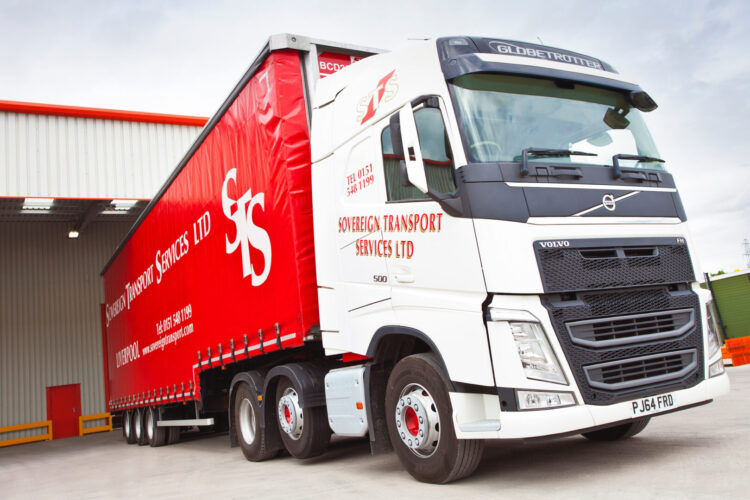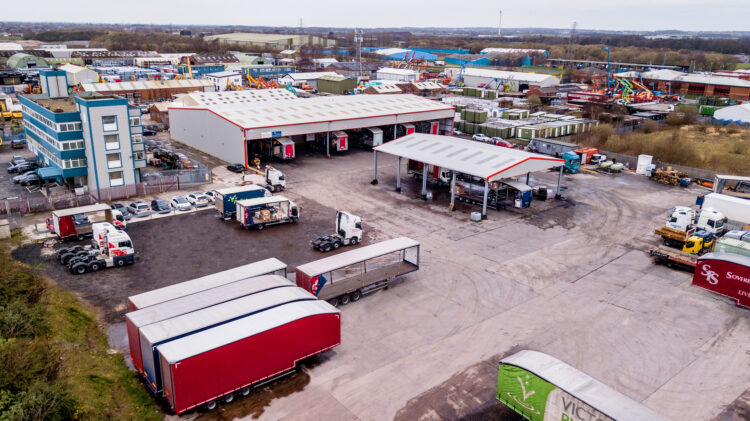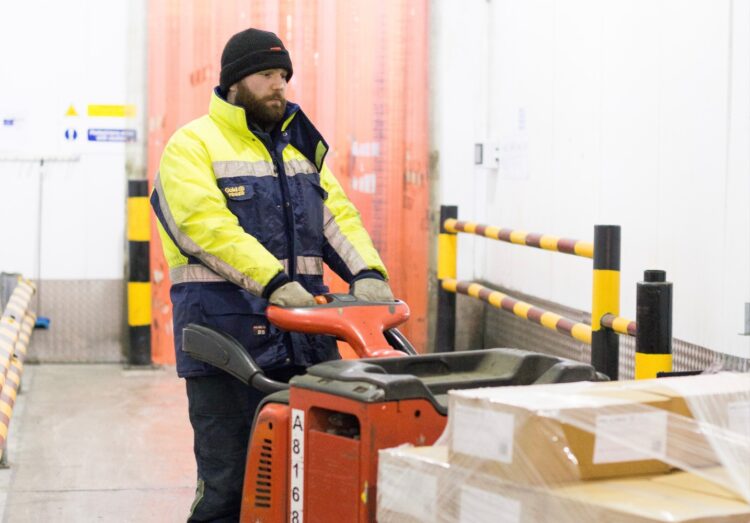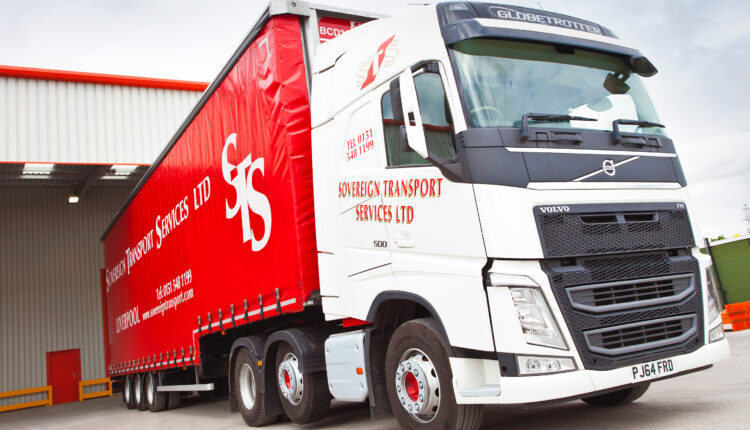Mersey logistics firms facing challenges head-on
With a shortage of HGV drivers and supply chain delays the UK logistics sector has never been more in the news and Liverpool city region firms are having their resilience tested. Tony McDonough reports

Logistics doesn’t often make the headlines but it has been high on the news agenda in the past few weeks as a chronic shortage of lorry drivers has had a huge impact on the UK economy.
Deliveries of everything from fuel to food, to raw materials for construction sites and factories have been affected. In the last week or so the Government has drafted in the army to deliver fuel to petrol stations, particularly in the South East.
And news of driver shortages in the UK has become global news. Analysis of Google search data by delivery management specialist Urbantz reveals that online searches for ‘truck driver UK’ across the globe exploded 1,300% from September 26 onwards.
The data also shows that interest in truck driver positions in the UK is the most widespread in Zimbabwe, followed by Nigeria and Sri Lanka. South Africa and Ireland were also among the countries with the highest online searches for ‘truck driver UK’.
However, there are also signs that the logistics sector is proving to be resilient in the face of the staff and supply shortage issues. According to the latest Barclays-BDO Logistics Confidence Index, confidence in the UK logistics sector has risen to 62.5, the highest level since the first half of 2015.
This is in contrast to last year’s Index, when confidence fell to its lowest level since 2012 amid heightened Brexit and COVID uncertainty. However, the strength of the recovery and optimism about the future reflects the improved clarity and visibility. This is allowing operators to make future investment plans.
Operators still face significant business challenges, with 96% pointing to staff shortages as their main concern and many are worried about the increased labour costs this will cause. However, the industry is addressing issues head on with 67% of companies saying they are investing more in recruitment.
Logistics is one of the biggest business sectors in Knowsley and firms in the borough operate across the UK. Below we focus on two – IBL Cold Stores and Sovereign transport. Both are demonstrating their resilience in the face of current challenges and are optimistic for their future growth prospects:
Sovereign Transport
When non-essential shops were forced to close at the height of the COVID-19 pandemic people had little choice but to sit at home and order goods online.
This was good news for logistics firms such as Sovereign Transport, which experienced soaring demand for home deliveries. And despite the shops now open as normal again the momentum has continued. Sovereign’s head of logistics, Adam Radcliffe, says the company is still enjoying record volumes.
Kirkby-based Sovereign has grown rapidly since it was founded by Steve Radcliffe in 1999. Back in those days it had just one vehicle, driven by Steve himself. Now the business employs 135 people and has a fleet of 60 vehicles. It is also part of two wider networks – Palletways and Pallet Track
However, as anyone watching the news will know, while demand may be booming in the logistics sector, the logistics of the sector are beset with problems. The shortage of HGV drivers across the UK has led to problems getting stuff delivered.
Adam, who is the founder’s son, says recruitment of new drivers has become a real challenge. He explained: “I have had an advert out for the past few months looking for new drivers to join us. What makes it more difficult is companies such as Asda willing to pay £0000s in welcome bonus payments. We can’t compete with that.
“One of the big causes of the problem is the backlog in the testing centres. They had to close during the pandemic so now they are having to play catch up. We have four or five lads waiting to take their tests but there is a 10 to 12-week wait.

“The HGV driving school that we use could get 10 people a week through tests before the pandemic but now that is down to three or four. I can’t see how this is going to get solved any time soon. We are running a driver programme from van to HGV but are struggling to get test dates.
“The last few months have been really tough on our drivers and the way they treated in this country is awful. They are paying money to park up in truck stops that don’t even have basic facilities such as working showers. Contrast that with mainland Europe where the facilities are often immaculate.”
Brexit is another issue that has had a big impact on Sovereign’s business. Prior to the UK’s exit from the European Union, the company would regularly deliver to the continent. Now, with the complexities Brexit has brought, they are happy to focus on the UK.
Sales manager Paul Hanson added: “After Brexit delivering to Europe has just become too much of a hassle. Right now we have plenty of work from our UK customers so we are just concentrating on that.
“Since the pandemic there has been a boom in internet shopping and customers seeing huge demand. That is showing no signs of stopping so that is good news for us.”
Adam says they are keen to keep expanding the business: “We have come a long way since my dad was driving the wagon himself and we have further to go. If we can ride this current wave then I’m confident we can keep on growing.”
IBL Cold Stores
“It was once said we are a nation of shop-keepers,” says Ian Desmonde. “But these days Britain is a net importer so it is more accurate to say we are a nation of warehouse-keepers.”
Ian is managing director of International Bulk Liquids (Storage & Distribution) of which IBL Cold Stores is one of two divisions along with its Bulk Liquids Division in Hull. Both business units play a critical part of the UK food supply chain storing raw materials for some of the country’s biggest food and drink manufacturers.
Products are largely imported through the country’s port network and then stored at one of IBL’s two facilities – Hull, which offers 40,000 cubic metres of storage space for bulk liquids, and Knowsley, which specialises in temperature-controlled storage solutions and employs around 30 people. The company has been trading for around 70 years.
Its Merseyside facility is based on Knowsley Industrial Park and offers 110,000 sq ft of temperature-controlled storage space across a number of bespoke chambers.
It devotes 65,000 sq ft to frozen storage, 20,000 sq ft to chilled storage and the remaining 25,000 sq ft is given over to tempering, product equalisation, blast freeze and enclosed loading bays. It has also recently added a further 30,000 sq ft of ambient to its service offerings to provide a truly unique one-stop shop to its client base.
“Tempering allows us to quickly turn frozen raw materials into chilled product using industrial microwaves” said Ian. “Blast freezing allows us to do the exact opposite and quickly freeze product prior to storage. These are essential added value services for the food manufacturer that we support with a just in time delivery service.”
Queues at petrol stations and the threat of empty supermarket shelves have become a staple of recent TV news bulletins against the backdrop of a national shortage of HGV drivers.

Ian said: “The problems we are having in logistics and transportation at the moment are quite complex and are caused by a combination of factors including Brexit, the pandemic and the disruption to global trade caused by the shortfall in shipping containers over the last 12 months or more.
“We store raw materials from Europe, the Americas, Asia, all over and so all these issues combined have had a huge impact on operations for both us and our clients.”
“The Government is relaxing the rules on drivers from the EU but I’m not sure how much good that will do in the short-term. The shortage of drivers in the UK has been a problem that has been building up for a few years and it is not restricted to this country.
“And it is not just a Government problem, either. The industry has to take some responsibility for the shortage of drivers. We simply haven’t attracted or trained enough people into the Industry over the past few years.”
Ian, who has worked in logistics for 30 years, adds that its recruitment issue doesn’t just revolve around drivers and explains “In the temperature-controlled storage and distribution sector it is referred to as the Amazon effect.
“People in our warehouses have to work in minus 18 degrees and attracting and retaining people to work in that environment can be a little harder. Retention and loyalty are key.”
Ian is full of praise for his team and their hard work during the 18 months of the COVID-19 pandemic. He said: “From the start our team were classed as key workers because of their role in the food distribution chain. Particularly in the early days of the pandemic when there were some initial shortages, our services were in great demand.
“Working in line with HMG guidelines created challenges of its own but despite any concerns for their own health and wellbeing and that of their loved ones the team at IBL rose to the challenges and we are immensely proud of them…our unsung heroes.”
“I think the difficulties in logistics won’t go away overnight, especially temperature-controlled logistics. We have Christmas coming up and that always creates extra pressure anyway.
“But I’m optimistic things will improve in the next six to 12 months. In terms of our business sector, certain challenges still remain but trading remains strong and the omens are good.”

